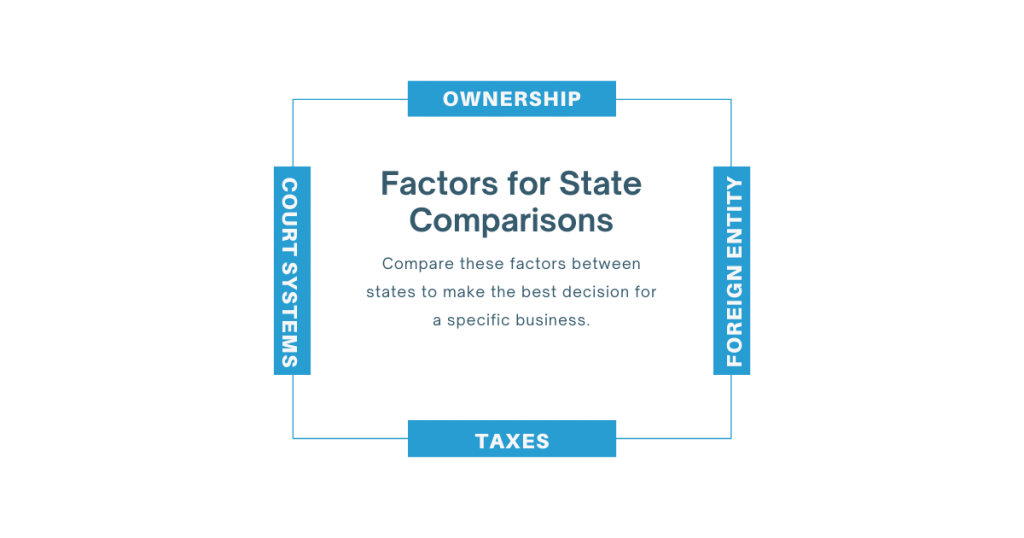Facebook, a company with origins in Cambridge, Mass. and synonymous with Silicon Valley’s cluster of tech-firm headquarters, is not incorporated in California or Massachusetts. Instead, it was incorporated in Delaware on July 29, 2004. Google, despite its Menlo Park roots, was also formed as a limited liability company (LLC) in Delaware. The list of companies created in states other than those where their operations are based, particularly business-friendly ones like Delaware, is endless.
Can a business owner form an LLC in another state? Absolutely. But, whether or not they should can vary. This article explores the answer to this question and underscores the benefits of forming an LLC in a state other than one’s own. It also weighs the logistical and financial restrictions put on small-scale operations.
Table of Contents
- What is an LLC?
- In What State Should I Create my LLC?
- Benefits of Forming an LLC in a Foreign State
- The Bottom Line
What is an LLC?
A limited liability company (LLC) is a legal entity formed to own and operate a business. Arguably the most straightforward business entity to create, LLCs are largely utilized by owners wishing to protect their personal liability and take advantage of pass-through or “flow-through” taxation. This allows the business’s profits and losses to be taxed at the owner’s personal tax rates. LLC entities also provide a simple organizational structure.
As opposed to corporations, LLCs are not required to have officers or boards consisting of a director and trustees. LLCs instead have “members” and are governed in accordance with their operating agreement, which determines the company’s ownership, management, and each member’s rights and obligations. LLCs are not exclusive to single-member ownership, however. In fact, most states do not restrict ownership. Members can include individuals, corporations, and other LLCs.
Like corporations, however, LLCs have to be created in a particular state. While companies usually have a choice about where to form, they usually do not have a choice about registering. Registering is different than formation, and an LLC is obligated to “register” in each state where it does business. Whether a particular activity requires an LLC to register will be determined by the state’s LLC legislation.
An LLC doing business in the state where it was formed is known as a “domestic LLC,” while an LLC doing business in a state other than the one where it was formed is known as a “foreign LLC.” Each state has different registration forms for foreign and domestic LLCs and usually charges much lower registration fees to domestic LLCs.
Finally, it’s important to make a special note about LLCs owned jointly by spouses. In community property states, a small business can be a single-member LLC or a partnership. In a non-community property state, an LLC needs to be filed as a partnership (but not a qualified joint venture).
(Read: How to Make an LLC)
In What State Should I Create my LLC?
As noted, a business owner can create their company in any U.S. state. Normally, massive businesses look for states with lenient tax codes and developed corporate laws to house their entity. In 2019, 67.8% of all Fortune 500 companies were based in Delaware alone, almost a quarter of which filed as LLCs. As impressive as that figure is, however, the majority of small-business owners will likely benefit from forming their LLC in the state where they operate.
Should a Small Business File as an LLC in Another State?

There are roughly 31 million small businesses in the United States, which is about 99% of all businesses in the country. Sixty million individuals work for small businesses, or 47% of the private workforce. They employ an average of ten staff members.
22.3 million out of 30.7 million small businesses are sole proprietors without employees, and a large portion of those companies operate through a single-member LLC structure. That’s because the LLC’s legal structure is accessible and simple to establish for operations like mom-and-pop retailers who run their businesses locally.
Comparing the following factors between states will ultimately inform the best decision on where to incorporate a “small” LLC:
- Annual filing and filing fee;
- Corporate income tax;
- Foreign entity requirements;
- Formation fee;
- Franchise tax;
- Investor input (if applicable); and
- State and local court systems for business conflicts.
Local LLCs like “mom-and-pop” shops are unlikely to gain any tax benefits or asset protection by forming in another state due to two crucial factors:
- Forming an LLC in another state will run the risk of causing a duplicate taxation problem in which the owner is subject to pay business income tax in both states. If a business is operating solely from a fixed location in a particular state, filing paperwork in a different state will not strictly bar them from having to register in the home state as well. Therefore, they may wind up paying business taxes, or at the very least administrative fees, for both states;
- Smaller-scale firms simply do not conduct enough business in other states to merit the high costs and hassle of setting up in a foreign state as a foreign LLC, a process that involves hiring a registered agent to represent the business in said state.
In short, small businesses are likely better off forming in their home state for logistical, practical, and often financial reasons. And, of course, local operations are inclined to represent the area and communities in which they conduct business.
Now, this is not all to say the benefits of forming an LLC in another state are solely reserved for colossal companies like Facebook and Google, as the following section highlights.
Benefits of Forming an LLC in a Foreign State

By examining what constitutes their business-friendly climates, the benefits of forming an LLC in any of the favorable states (Delaware, Nevada, South Dakota, and Wyoming) can be understood.
Delaware
There are numerous reasons why Delaware has been dubbed the de facto “incorporation capital of America.” Let’s take a look:
- A flexible legal framework that serves business protection. One of the primary distinctions between Delaware and other states less favored for foreign entity formation is the Delaware General Corporation Law, which grants extensive protections to businesses in regards to tax policies and liability defense. Several states have adopted related protections through the legislative process to attract big firms seeking such perks.
- It’s legal. It is no surprise that business-enabling states embed their philosophy into tangible laws. After all, while aiming to circumvent certain liabilities, companies do not wish to partake in any unlawful practices. Setting up an LLC in states favoring business and the legal entities on which they are built is 100% legal under state and federal law. If a business stands to gain an advantage through formation in another state, the owner(s) can rest assured the process is indeed legitimate.
- Tax havens. The New York Times first reported about a so-called “Delaware loophole” in 2012, stating companies were shifting royalties and similar revenues from their home-state operations to holding companies in Delaware — companies, usually LLCs, designed to hold shares of parent entities — where they are not taxed. This tactic resulted in $9.5 billion in tax savings for the corporations. Since then, more and more states have co-opted similar functions by following suit. Why? Business incorporation fees typically account for a state’s second-largest revenue source behind income tax, thus incentivizing business formation and support.
- Specialized courts and history of cases. The sheer amount of companies flocking to Delaware is in large part due to their Court of Chancery. The court handles matters pertaining to legal disputes arising from lawsuits and injunctions instead of damages. This specialty results in expedited resolutions to cases involving LLC owners, whereas other states’ civil courts backlog corporate cases. Since the state processes more trials due to the vast number of companies, the body of case law is expansive and serves as a reference for owners and their lawyers. A company in an industry with constant litigation can make the most of such legal proceedings; therefore, it would be logical for its owners to consider forming their LLC in Delaware or similar states.
Nevada
Nevada has several benefits that make it another popular choice for businesses looking to incorporate outside of their home states. For starters, the state doesn’t charge taxes on:
- Business income;
- Capital gains;
- Corporate shares;
- Franchise taxes;
- Inheritances; and
- Personal income.
Nevada also has strong privacy and liability protection for business owners. It doesn’t require businesses to file operating agreements with the state or host annual meetings with shareholders. It also allows owners to remain anonymous. Finally, it has no information-sharing agreement with the IRS.
There are, however, a few cons to incorporating in Nevada:
- The state charges an annual commerce tax to every business with revenue over $4 million;
- LLCs in Nevada are required to employ a “registered agent” to serve as the official representative for the business from within the state, creating an additional expense for the business owners; and
- While operating agreements don’t have to be filed with the state, a business’s articles of organization do.
South Dakota
Business owners don’t have to reside in or be citizens of South Dakota to incorporate an LLC in the state, but they are required to maintain a “registered agent.” This person acts as the business’s local point of contact within the state. Also, LLCs can have an unlimited number of owners. LLCs are considered “perpetual entities,” which allows a business’s operations to continue if the owner(s) ever die(s) or become(s) incapacitated.
The asset protection and tax benefits in South Dakota are impressive. Personal assets are protected from business creditors, and business assets are protected from personal creditors. LLCs can choose to be taxed as an S-corporation or a C-corporation. Additionally, South Dakota doesn’t charge the following taxes:
- Business inventory tax;
- Corporate income tax (unless the business is a bank or other financial institution);
- Inheritance tax;
- Personal income tax; and
- Personal property tax.
Wyoming
Wyoming was the first state in the U.S. to permit Limited Liability Companies. Owners don’t need to be U.S. citizens and can remain completely anonymous, but LLCs again have to maintain a registered agent to act as the company’s representative. The state also allows a “lifetime proxy,” which permits an owner to appoint another person to represent their shares and vote on their behalf. This is beneficial to owners that want to remain anonymous.
Businesses in Wyoming don’t have to file state tax returns because it doesn’t charge franchise or business income taxes. They also don’t have to file operating agreements with the state but do have to file an annual report. LLCs in Wyoming also benefit from personal and business asset protection from creditors.
Wyoming does offer a special categorization called a Close Limited Liability Company. Close LLCs are specifically single-member LLCs or LLCs that are owned by family members or very “close” friends. They have slightly different benefits and restrictions than a traditional LLC in Wyoming:
- 35-owner limit;
- Considered to be regular LLCs by the IRS for federal purposes;
- No annual meeting requirement;
- No state notification requirements of administrative decisions;
- Owners don’t have to be residents of Wyoming;
- When one owner dies or wants to sell their shares, the other current members get the right of first refusal of those shares.
The Bottom Line
So, can an LLC be formed outside its home state? Yes, but a better question to ask is: Would the business benefit from doing so? Small business owners, as seen, would not stand to gain much from avoiding tax liabilities, whereas large companies are prone to find such factors more appealing. In the worst-case scenario, a regular small business owner can experience unforeseen tax implications or, at the very least, create an administrative headache and face the costs of dissolution.
A helpful rule-of-thumb to follow goes: if a company has fewer than five shareholders, it is recommended to form the LLC in the home state. That being said, business owners — from sole proprietors to those employing hundreds of workers — should weigh their options to come to a decision that makes sense for the company. And, of course, consult an attorney in order to anticipate any legal risks involved in foreign entity formation.
